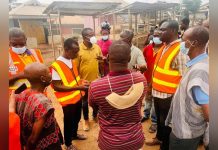Africa-Press – Ghana. The Auditor General’s latest report revealed that the Ada East and Ada West Districts together expended more than GH¢43 million in past fiscal year.
Yet, for many residents, the reality on the ground, including poor roads, under-resourced schools, and struggling health facilities, does not reflect the use of such colossal sums.
So, the people of Ada East and Ada West Districts are restless, mounting questions not only about the GH¢43 million already spent by their District Assemblies, but also about how a fresh GH¢4.7 million released under the District Assemblies Common Fund (DACF) will be used.
Now, with a new disbursement of GH¢4.7 million from the DACF Secretariat for the first quarter of 2025, residents are asking a hard question: If yesterday’s money left no trace, what assurance is there that tomorrow’s will?
The GH¢43m Question
The Auditor General’s Report gave little detail about how the GH¢43 million was allocated. Residents, civil society, and governance advocates have demanded clarity. If the funds had been properly utilised, there would have been visible results of rehabilitated roads, upgraded markets, improved healthcare delivery, and enhanced schools in the districts. Instead, communities continue to grapple with basic challenges.
This supposed lack of transparency has fuelled suspicions that the Assemblies may not be prioritising development as expected.
Fresh Funds, Fresh Fears
The new allocation of GH¢4.7 million offers an opportunity to address pressing development needs. But without strict accountability, it risks becoming another figure on paper, swallowed by weak oversight and opaque spending.
To prevent history from repeating itself, citizens, civil society organisations (CSOs), and watchdogs insist that assemblies must present clear, measurable plans for how the funds will be deployed and a regular follow-up and public updates.
The Missing Town Halls
A key gap in local governance has been the absence of consistent town hall meetings. These platforms are not ceremonial; they are constitutionally mandated spaces where assemblies report on revenue, expenditure, and project outcomes to the very people they serve. Unfortunately, there is little evidence that such sessions have been held consistently or that detailed financial reports have been shared with residents.
Without town hall meetings, residents remain in the dark, becoming passive observers instead of active stakeholders. Whenever there is darkness in governance, mistrust breeds.
What citizens want to know
The questions echo across Ada East and Ada West: residents want to know the projects carried out with the GH¢43 million fund and how much went into infrastructure, healthcare, education, and social interventions.
They also enquire about the safeguards put in place to ensure the GH¢4.7 million released by DACF delivers value for money.
These are not abstract questions; rather, they touch on whether a child walks miles to school on a dusty road, whether a mother can access quality care at the local clinic, and whether a farmer has a reliable market for his produce.
Public confidence in local assemblies depends on accountability. When leaders cannot account for funds, it undermines their credibility and weakens the very development agenda they are mandated to champion.
Civil society groups and the media have vowed to keep the spotlight on Ada East and Ada West.
The call to action
The demand from citizens is unambiguous: render a full account of the GH¢43 million already spent, provide a transparent plan for the new GH¢4.7 million allocation, and commit to regular town hall meetings and open reporting.
Metropolitan, municipal and district assemblies (MMDAs) must recognise that community monitoring is non-negotiable. With social media, digital networks, and citizen watchdogs in place, silence and secrecy are no longer options.
The Ada Assemblies stand at a crossroads. They can choose transparency and rebuild public trust or continue in opacity and face unrelenting scrutiny.
The message is clear: accountability is not optional; it is the price of public service.
Source: Ghana News Agency
For More News And Analysis About Ghana Follow Africa-Press







